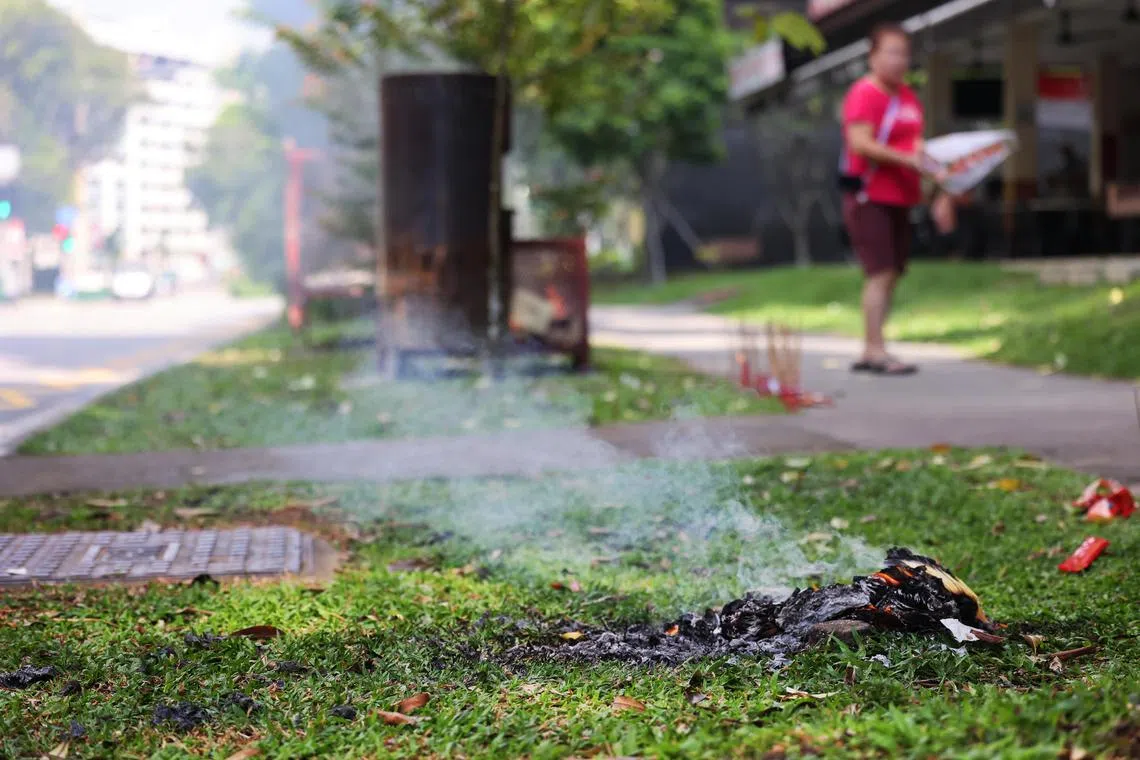Fewer complaints over indiscriminate burning of joss paper
Sign up now: Get ST's newsletters delivered to your inbox

The volume of public feedback on indiscriminate burning of joss paper during the seventh lunar month fell by 31 per cent in 2024, compared with 2021.
PHOTO: LIANHE ZAOBAO
SINGAPORE – Fewer people are burning joss paper indiscriminately, going by the latest figures from the Ministry of National Development.
The volume of public feedback on indiscriminate burning of joss paper during the seventh lunar month fell by 31 per cent in 2024, compared with 2021, before the public education campaign by the Alliance for Action (AfA) on Norms for Joss Paper Burning.
The seventh lunar month is when burnt offerings are made to the dead to observe the Hungry Ghost Festival.
For the Chinese New Year period, feedback volume also fell – by 23 per cent in 2025, compared with 2022, before the AfA’s campaign.
With this, the AfA has achieved its mission and will wrap up nearly three years after it was set up in July 2022 to educate the public on responsible joss paper burning.
The group is supported by the Municipal Services Office (MSO) as its secretariat.
Announcing the closure of the AfA at a media briefing on March 14, Ms Sim Ann, Senior Minister of State for National Development and adviser to the AfA, said: “Over the past three years, we have gone through three cycles of public education for each of the two peak periods of joss paper burning – the seventh lunar month and Chinese New Year.
“We are very glad to see that the modified public education campaigns guided by the AfA has shown effect.”
The turning point came when the AfA characterised joss paper burning as a customary practice rather than a religious requirement, Ms Sim said.
The AfA brought in cultural experts to advise the public on how to modify their practices to ensure harmonious living in neighbourhoods.
She added that jingles on radio, advertisements on digital display panels at Housing Board blocks, advertising materials next to joss paper products at supermarkets, getai shows and public dialogues have helped educate the public on responsible joss paper burning.
Moving forward, the National Environment Agency will continue the public education campaign developed and shaped by the AfA.
AfA members, comprising representatives from over 10 Chinese religious, cultural and industry groups, will still be tapped for their expertise when there is a need. They include those from the Singapore Federation of Chinese Clan Associations, Singapore Religious Goods Merchants Association and Taoist Federation Singapore.
Mr Kua Soon Khe, chief executive of the Singapore Buddhist Federation and who co-led the AfA, said the AfA’s key message is to be considerate towards the environment and one’s neighbours when burning offerings.
It also urged devotees to burn smaller quantities at a time to ensure complete combustion and reduce smoke and ashes. Devotees should not throw a whole stack of joss paper into the burner or toss them into the air. They should also clear all the prayer items and offerings from public places after the ritual to keep the environment clean.
Mr Kua said: “We wanted to convey the message that while we can preserve customary practices, they can evolve with the times, such as how many have simplified funeral rituals now compared with the past.”
He initially expected the AfA to take three to five years to see results.
“This shows that given the right public education, Singaporeans can accept changes,” he said.
When asked if the AfA would need to regroup if complaints increase in the future, Ms Sim said the MSO will continue to monitor feedback. If the situation deteriorates, it will assess what needs to be done.
“If we should see a resurgence of feedback, we would need to analyse the reasons, and see if there is any element of the public education that requires reinforcement or whether there are some other changes going on,” she said.
“We’re not going to take our eyes off the ball.”
Chin Soo Fang is senior correspondent at The Straits Times covering topics such as community, politics, social issues, consumer, culture and heritage.


